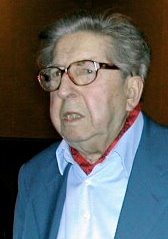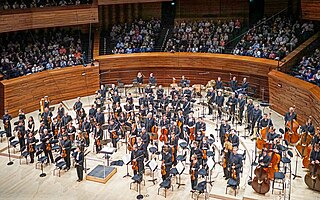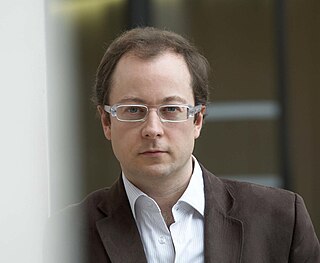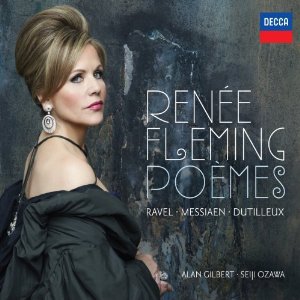
Seiji Ozawa was a Japanese conductor known internationally for his work as music director of the Toronto Symphony Orchestra, the San Francisco Symphony, and especially the Boston Symphony Orchestra (BSO), where he served from 1973 for 29 years. After conducting the Vienna New Year's Concert in 2002, he was director of the Vienna State Opera until 2010. In Japan, he founded the Saito Kinen Orchestra in 1984, their festival in 1992, and the Tokyo Opera Nomori in 2005.

Renée Lynn Fleming is an American soprano, known for performances in opera, concerts, recordings, theater, film, and at major public occasions. A recipient of the National Medal of Arts, Fleming has been nominated for 18 Grammy Awards and has won five times. In June 2023, the John F. Kennedy Center for the Performing Arts announced that Fleming would be one of the five artists recognized at the 2023 Kennedy Center Honors, which she received in December 2023. Other notable honors won by Fleming have included the Crystal Award from the World Economic Forum in Davos, the Chevalier de la Légion d'Honneur from the French government, Germany's Cross of the Order of Merit, Sweden's Polar Music Prize and honorary membership in England's Royal Academy of Music. Unusual among artists whose careers began in opera, Fleming has achieved name recognition beyond the classical music world. In May, 2023, Fleming was appointed by the World Health Organization as a Goodwill Ambassador for Arts and Health.

Henri Paul Julien Dutilleux was a French composer of late 20th-century classical music. Among the leading French composers of his time, his work was rooted in the Impressionistic style of Debussy and Ravel, but in an idiosyncratic, individual style. Among his best known works are his early Flute Sonatine and Piano Sonata; concertos for cello, Tout un monde lointain... and violin, L'arbre des songes ; a string quartet known as Ainsi la nuit ; and two symphonies: No. 1 (1951) and No. 2 Le Double (1959).
Paul Bonneau was a French conductor, composer and arranger, whose career was mainly in the field of light music and films.

The Orchestre Philharmonique de Radio France is a French radio orchestra, affiliated with Radio France. The orchestra performs principally at the auditorium of the Maison de la Radio in Paris, along with several concerts at the Philharmonie de Paris.
Tsuyoshi Tsutsumi is a world renowned Japanese cellist. In an international career which began in 1960, he has performed as soloist with prominent orchestras and conductors in many countries and given recitals and chamber music performances with distinguished collaborators.
Shéhérazade is the title of two works by the French composer Maurice Ravel. Both have their origins in the composer's fascination with Scheherazade, the heroine and narrator of The Arabian Nights. The first work, an overture (1898), Ravel's earliest surviving orchestral piece, was not well received at its premiere and has not subsequently been among his most popular works. Four years later he had a much greater success with a song cycle with the same title, which has remained a standard repertoire piece and has been recorded many times.
Anthony Dean Griffey is an American opera tenor. He is a regular presence on the stages of opera houses and concert halls around the world. Griffey has also been noted for his acting talent in addition to his voice.
Jane Henschel is an American operatic mezzo soprano. Henschel, who was born in Wisconsin, studied at the University of Southern California, and then pursued further studies in Germany, where she has made her home. Her numerous opera appearances include Baba the Turk in Igor Stravinsky's The Rake’s Progress with Glyndebourne Festival Opera, the Saito Kinen Festival Matsumoto, and the Salzburg festival; Brangäne in Richard Wagner's Tristan und Isolde with Paris Opéra and the Los Angeles Opera; the Principessa in Giacomo Puccini's Suor Angelica with conductor Riccardo Chailly and the Royal Concertgebouw Orchestra; Blanche de la Force in Francis Poulenc's Dialogues des Carmélites in Amsterdam; Kostelnicka Buryjovka in Leoš Janáček's Jenůfa under Seiji Ozawa in Japan; and the Kabanicka in Janáček’s Katya Kabanova at the Salzburg Festival among others.

Guillaume Connesson is a French composer born in 1970 in Boulogne-Billancourt.

Poèmes is a 2012 album of French songs sung by operatic soprano Renée Fleming. Ravel's Shéhérazade (1903) and Messiaen's Poèmes pour Mi (1936) are followed by two sets of songs by Henri Dutilleux. He transcribed Deux sonnets de Jean Cassou for Fleming and composed Le temps l'horloge specifically for Fleming. The album won the 2013 Grammy Award for Best Classical Solo Vocal Album.

Tout un monde lointain... is a concertante work for cello and orchestra composed by Henri Dutilleux between 1967 and 1970 for Mstislav Rostropovich. It is considered one of the most important 20th-century additions to the cello repertoire and several major cellists have recorded it. Despite the fact that the score does not state that it is a cello concerto, Tout un monde lointain... has always been considered as such.
The Saito Kinen Orchestra is an orchestra formed annually during the Saito Kinen Festival Matsumoto, which is held every August and September in Matsumoto city, Nagano, Japan. The orchestra is managed by the Saito Kinen Foundation.

Hideo Saito was a Japanese cellist, conductor, and music lecturer.
Deux sonnets de Jean Cassou is a song cycle for baritone and piano written by the French composer Henri Dutilleux in 1954. He later transcribed or allowed transcriptions of the work for various ensembles.

Elliot Madore is a Canadian lyric baritone with an international operatic career.
Pascal Rophé is a French conductor. He is currently music director of the Orchestre national des Pays de la Loire.

La Damoiselle élue, L. 62, is a cantata for soprano and contralto soloists, 2-part female chorus, and orchestra, composed by Claude Debussy in 1887–1888 based on a text by Dante Gabriel Rossetti. It premiered in Paris in 1893.
Philippe Tondre is a French-British classical oboist. He has served as Principal Oboist of the Philadelphia Orchestra since 2020, and a professor of Oboe at the Curtis Institute of Music since 2022.










